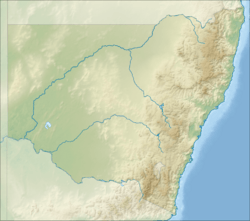Numeralla River facts for kids
Quick facts for kids Numeralla |
|
|---|---|
|
Location of the mouth of the Numeralla River in New South Wales
|
|
| Other name(s) | Umaralla River |
| Country | Australia |
| State | New South Wales |
| Region | South Eastern Highlands (IBRA), Monaro |
| Municipality | Snowy Monaro Regional Council |
| Physical characteristics | |
| Main source | Kybeyan Range east of Nimmitabel 1,070 m (3,510 ft) 36°30′27″S 149°25′20″E / 36.50750°S 149.42222°E |
| River mouth | Murrumbidgee River north of Cooma 706 m (2,316 ft) 36°3′56″S 149°9′1″E / 36.06556°S 149.15028°E |
| Length | 94 km (58 mi) |
| Basin features | |
| River system | Murrumbidgee catchment, Murray–Darling basin |
| Tributaries |
|
The Numeralla River is a special river in New South Wales, Australia. It flows all year round, which means it's a perennial river. This river is part of a bigger water system called the Murrumbidgee catchment. This catchment then joins the even larger Murray–Darling basin. The Numeralla River is found in the Monaro region.
Some people say the name "Numeralla" comes from an Aboriginal word. They believe it means "valley of plenty." However, some experts are not sure if this meaning is correct.
Contents
River's Journey: Where the Numeralla River Flows
The Numeralla River starts high up in the Great Dividing Range. This is about 12 kilometers (7.5 miles) east of a small town called Nimmitabel. From there, it flows mostly north and west.
As it travels, other smaller rivers and creeks join it. These smaller waterways are called tributaries. The Numeralla River has eight tributaries, including the Kybeyan River and the Big Badja River. Finally, the Numeralla River meets the Murrumbidgee River. This meeting point is north of Cooma.
The river drops about 367 meters (1,204 feet) along its 93-kilometer (58-mile) journey. This drop in height creates a varied and interesting course.
Wildlife in the Numeralla River
The Numeralla River is home to many different kinds of animals. It has a rich and diverse ecosystem. You might even spot some rare creatures here.
For example, the Wanderer's Kingfisher is an uncommon bird that lives near the river. Another special animal is the Kiora frog. These creatures show how important the river is for wildlife.
Fish in the River
The fish in the Numeralla River have changed over time. Originally, the river had its own native freshwater fish. However, these native fish were completely replaced by introduced trout species. Later, another introduced fish, the European carp, became common. This change in fish species is a common situation in many rivers in south-east Australia.
Gold Discovery in the Numeralla River
In 1858, people found gold in and along the Numeralla River. This discovery led to a period of gold digging. Miners worked to find gold in the river for about ten years. The gold diggings continued until 1868.
 | Stephanie Wilson |
 | Charles Bolden |
 | Ronald McNair |
 | Frederick D. Gregory |


